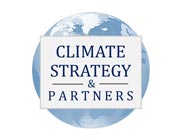
By Peter Sweatman and Adriana Rodriguez
Published in September 2025
The European Commission’s proposal for the next Multiannual Financial Framework (MFF) represents a crucial opportunity to bridge Europe’s vast climate investment gap—estimated at €340–477 billion annually—while strengthening clean industrial competitiveness and enhancing energy security.
This briefing, building on Climate Strategy’s 2024 flagship report, evaluates the Commission’s budget proposal through an “efficiency-first” lens. It applies an economic efficiency framework to ensure that decarbonisation and competitiveness goals are achieved fairly and effectively, using the most appropriate funding instruments. Grants—Europe’s most valuable and limited resource—must be reserved for innovation, research, and social or environmental priorities where financial instruments cannot deliver the same impact.
The report highlights that deploying EU funds efficiently is key to crowding in private capital and ensuring value for money. This requires evidence-based Work Programmes that target priority supply chains, simplify delivery, and channel EU finance to beneficiaries that need it most.
At the heart of the proposal is the European Competitiveness Fund (ECF), envisioned as a one-stop shop for EU financial instruments. Through the InvestEU framework, the ECF could help scale up strategic clean technologies and leverage national and regional funding under National and Regional Partnership (NRP) Plans to attract private investment in mature solutions.
Climate Strategy’s briefing outlines four core building blocks for a strategic, efficient, and climate-aligned MFF:
By adopting an efficiency-first approach, the next MFF can unlock private capital, accelerate the green transition, and secure Europe’s long-term competitiveness.
Milestones include:
The report was presented on September 24th 2025 during a European Parliament roundtable co-hosted by MEPs Niels Flemming Hansen (EPP), Rasmus Nordqvist (Greens/EFA) and Thomas Pellerin-Carlin (S&D). The roundtable featured Members of Parliament, Commission representatives, investors, industry leaders and experts from think tanks and civil society to discuss how the EU Budget can be designed more strategically and efficiently. Read Linkedin post here.
